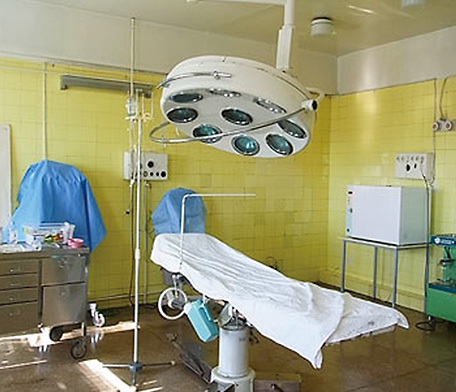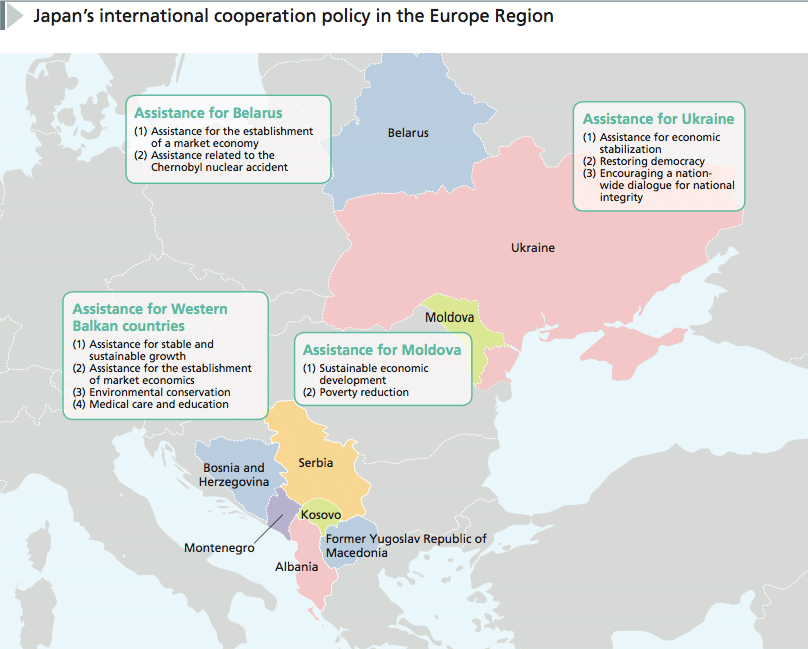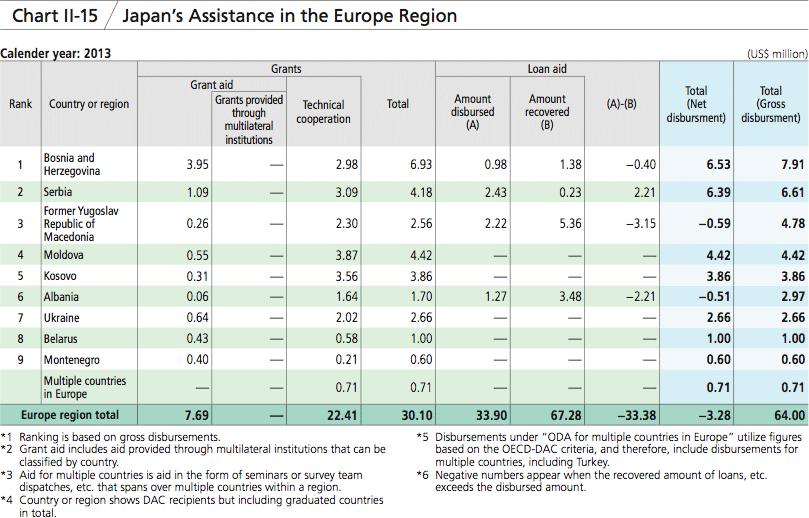8. Europe
Many of the countries in Central and Eastern Europe and the European region of the former Soviet Union that had previously been under communist systems have subsequently achieved democratization and liberalization. They are currently working towards economic development based on market economies under democratic administrations. Japan has provided assistance for efforts such as the transition to market economies, reconstruction of economic infrastructure, and addressing environmental issues. The aim is to further promote stability and development in these regions and in Europe as a whole, as well as to build relationships based on shared universal values (human rights, democracy, market economy, and rule of law).
< Japan's Efforts >
Reforms had once slowed in the Western Balkans(Note 8) due to the impact of conflicts which occurred in the 1990s. However, assistance from donor countries and international organizations, as well as their own efforts for reform, have enabled them to graduate from the stage of receiving aid for reconstruction. Currently, they are at a stage where they require assistance aimed at sustainable economic development. Japan has provided assistance on the three main pillars of “consolidation of peace,” “economic development,” and “regional cooperation” that were confirmed at the Ministerial Conference on Peace Consolidation and Economic Development of the Western Balkans was jointly held by Japan and the EU in 2004, as its priority areas for development cooperation. Japan also continues to provide assistance with the “consolidation of peace and ethnic reconciliation” and “addressing environmental and climate change issues” as its particular priority policies.
Ukraine and Moldova, part of the former Soviet States, are geopolitically and diplomatically important since they are located between Russia and the EU. The stability and sustainable development of these countries are indispensable for the stability of Europe as a whole. Japan assists in their efforts to consolidate democracy and establish market economies. In this regard, in March 2014, Japan announced an assistance package of up to ¥150 billion to Ukraine based on the deteriorating situation in the country.
In light of disparities in economic development in Europe, Japan gradually reduces assistance to new EU member countries, deeming them as having graduated from ODA, and encourages them to become donors to provide development cooperation to less developed countries in Europe. At the same time, Japan continues to provide appropriate support to the less developed countries like those of the Western Balkans and Ukraine, considering their economic levels. In addition, regardless of the country receiving the aid, Japan focuses more on results and effective and efficient aid by utilizing Japan's knowledge and experience, while paying attention to the activities of other donor countries and international organizations.
Some of the former recipients of Japan's ODA were removed from the list of the countries eligible for ODA assistance when they joined the EU, and are now beginning to fulfill an international role as donor countries. Japan works to share its experiences with those countries including the Visegrad Group (V4)(Note 9) as a donor country.
- Note 8: Western Balkan countries: Albania, Bosnia and Herzegovina, Croatia, Kosovo, Montenegro, Serbia, and the former Yugoslav Republic of Macedonia
- Note 9: Visegrad Group (V4): Czech Republic, Hungary, Poland and Slovakia
| Moldova
Project for Improvement of Medical Care Service
Loan Aid (June 2013 - Ongoing)

An operation room of the National Scientific-Practical Centre of Emergency Medicine, one of the target hospitals of the project. Although it is equipped with general operating facility, there is a shortage of advanced medical treatment equipment. (Photo: JICA)
In Moldova, the economic and financial situation deteriorated after gaining independence from the former Soviet Union. Under these circumstances, healthcare financing was squeezed, and as a result, people were unable to receive sufficient healthcare services. The fact that healthcare costs used to be paid in full by the national treasury, coupled with the inefficiencies caused by the existence of too many hospitals, also factored into the situation. Over the next 20 years, the Government of Moldova worked to improve the healthcare service level by introducing a universal health insurance system to promote healthcare financing reform, as well as encouraging medical institutions to share responsibilities and coordinate amongst each other.
Medical institutions in Moldova have many healthcare professionals who have relatively high levels of expertise. Nonetheless, the institutions are prevented from providing sufficient general medical examinations and treatment due to shortages of medical equipment. In addition, the institutions face challenges in offering care for diseases that require high levels of medical expertise, such as cardiovascular diseases and cancers that have an increasing rate of incidence.
In order to address such issues, Japan has been providing support to hospitals around the capital city of Chisinau that are capable of offering critical and emergency medical care, a core service in the hospital sector. Specifically, Japan provides medical equipment and testing equipment, including advanced medical equipment such as CTs and MRIs manufactured in Japan, through the ODA loan project, “Project for Improvement of Medical Care Service” (STEP1), extended in 2013. In conjunction with this project, Japan will implement technical cooperation mainly for the staff of the project's hospitals, aiming to enhance the staff's capacity in the maintenance and management of equipment. Japan will continue to support healthcare reform in Moldova by making comprehensive use of Japanese technologies.
(As of August 2014)
*1 STEP: Special Terms for Economic Partnership
STEP was introduced in 2002, with a view to raising the visibility of Japanese aid through technology transfers to developing countries and the use of Japan's advanced technologies and know-how. The operational rules of STEP include: the prime contractor shall be a Japanese company; and more than 30% of the goods and services should be procured from Japan.


